As the famous Greek Philosopher, Aristotle once said ”Human beings are curious by nature.” It is in their DNA to ask questions. To ask why something happens, or how something works. The process of any discovery begins with a simple question, WHY? Out of so many of them, one is, “Is water wet?”
This quest for answering this “why” is what causes any discovery to be made. In fact, many scientists believe that humans are different from animals due to just one factor. That factor is our ability to use reasoning and solve complex problems.
Since ancient times, humans have been trying to find answers to the problems in our universe. For the most part, they have been successful in finding these answers. For example, the origins of something as complicated as dentistry can be traced back to 7000 BC.
As more and more people try to find the answer, the more viral that topic gets. A similar instance occurred not too long ago. In November 2017, the question ” Is water wet?” was blowing up the internet. Sure it seems like an obvious question but it was anything but obvious. So without further ado, let’s go ahead and see what both sides puts forward to support their claim.
What is Wetness?
The answer to whether water is wet or not relies heavily upon the definition of wetness. There are two main definitions that are usually accepted.
According to Oxford Language Dictionary, wet is considered to be ”Covered or saturated with water or another liquid”. Whereas, according to Miriam Webster, wet is determined when ”consisting of, containing, covered with or soaked with liquids.”
As we said, according to the definitions, an argument can be made for both yes and no. Let us elaborate. Wetness is the quality of any liquid sticking to a solid.
Whether something can be wet or not depends on the forces of both the liquid and the solid. These forces are the cohesive force of a liquid and similarly the adhesive force of a solid.
Suppose a liquid has a cohesive force but the solid does not have any adhesive force. In this case, the solid will not become wet. Similarly, in the case of a strong adhesive force of a solid but no cohesive force will also result in no wetness.
Interestingly, it is considered to be better for wetness if the liquid has a lower cohesive force as compared to the adhesive force of the solid. As too much cohesive force will result in the liquid being stuck in itself.
What About Water?
According to various scientific studies, water has actually very strong cohesive forces. Interestingly, due to this, it is actually much easier for liquids such as oil and alcohol to make a surface wet.
According to these arguments and the result in forces, one could make an argument for both sides. An experiment conducted by renowned Dr. Diana Glick (Professor and Director of the Underground Studies Department of Chemistry, Georgetown University.) stated that water is indeed not wet. She stated in her study that ”water is not wet as it is a wetting agent.”

According to Dr Diana, water when saturated with itself will have a cohesive reaction. This is because the water in itself does not have any adhesive forces. Therefore, it can not be considered wet in itself. For water to wet something, it needs a solid with some adhesive force.
Instead, when the water has a cohesive reaction with water, the result is the formation of hydrogen bonds among the molecules. This further results in these molecules sticking together.
As we said earlier, the answer to the mystery is water wet depends on the definition we choose. If we are to define it as a physical feeling or a reception when we make contact with something. In that case, yes water can be considered wet.
Similarly, if the chosen definition is that wet is something with moisture then the answer to the question is water wet. will indeed remain yes.
Conclusion to “Is Water Wet”
Ultimately, the answer to the mystery, is water wet? seems more like a philosophical one. As the saying goes ” people see what they want to see ”. We can also choose from many definitions of the word and justify our answer.
The answer to the question of whether is water wet? can be both yes and no, as it all depends from person to person. This can also be considered to be a case where there are no wrong answers as both are acceptable in their own way.
As far as the science goes, we have seen that the evidence does lean more towards water not being wet. But we would again like to remind you that answer can also be changed if we change the definition.
Till now, there is no definite answer to this mystery and hopefully, we advancements in sciences and technology, we will get a final answer. Till then, the mystery is water wet remains unsolved.

